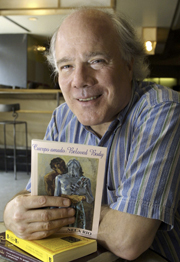
Multilingual poet Hugh
Hazelton teaches Spanish translation at Concordia.
Photo by Andrew Dobrowolskyj
|
by James Martin
Newly appointed to a tenure-track position, Hugh Hazelton has been teaching
Spanish translation and civilization courses at Concordia since 1988.
Hazelton is also an accomplished multilingual poet and translator, as
well as a native of Chicago, raised in English. He’s quick to anticipate
the inevitable question.
“You might be thinking, ‘How did he get into Spanish?’”
he says with a good-natured shrug. Then he reels off his seminal early
influences, including a childhood interest in archaeology (specifically
pre-Colombian civilizations), and a close friend who introduced him to
Chicago’s vibrant Mexican community. “I was just always interested
in Latin America.”
His career as a translator evolved in a similarly natural fashion.
“Starting with Brazil in ’64, waves of political oppression
pushed people north to Canada,” Hazelton explains, noting that new
Spanish-speaking arrivals concentrated in Montreal, Toronto and Ottawa.
“There was Chile in ’73, and Argentina in ’76. Then there’s
been the Colombians, the Salvadorans, the Guatemalans . . .”
Hazelton himself settled in Montreal after travelling extensively in Peru,
Argentina and Brazil during the mid-1970s. He began volunteering his multilingual
services to local Latin-American solidarity groups. Soon, friends asked
him to translate Spanish scripts for the National Film Board. Short story
translations, then entire books, followed.
By the mid-1980s, Hazelton figured there was a PhD dissertation topic
lurking somewhere in all this translation experience, and enrolled in
the Canadian comparative literature program at the Université de
Sherbrooke.
He’s now working on a second PhD, this one in Hispanic studies at
the Université de Montréal.
While working on his first PhD, Hazelton co-edited (with Gary Geddes)
and was principal translator of Compañeros: An Anthology of
Writings About Latin America, collecting both Canadian writings about
Latin America and the work of Latin-American authors now living in Canada.
The Montreal/Latin America connection continues to thrive, he says, as
evidenced by events such as the monthly Proyecto Cultural Sur poetry
readings, organized by local poets Hector Torres and Tito Alvarado.
“Even today,” he adds, “Brazilians really like Anne Hébert,
the Québécois writer.”
Hazelton’s extensive translations include a book of short stories
by Salvadoran ex-pat Alfonso Quijada Urías, an anthology of Latin
American legends called Jade and Iron, and a volume of poetry by
Nela Rio, an Argentinean writer living in Fredericton since the late ’60s.
Hazelton was also heavily involved with Ruptures, a now-defunct
but highly ambitious literary journal. (Each issue offered simultaneous
English-French-Spanish-Portuguese translation of each article.)
His most recent translation is Beloved Body (Cuerpo amado), a second
book by Nela Rio. Characteristic of her work, Beloved Body is sparse,
precise, and carefully constructed. Through oblique, abstract imagery,
the book tells the story of a man and woman who developed a passionate
relationship “when life was already a fixed point,” and how
the woman’s ensuing breast cancer affects this relationship.
Before contemplating a literary translation, Hazelton says it’s essential
he feel “close to the text.” He was attracted by how Rio “writes
about themes that a lot of people don’t write about in poetry, about
people later in life experiencing sickness, old age, eroticism.”
He was also engaged by Rio’s use of “really honed-down language”
— a selling-point not without its translation difficulties. “There’s
no wasted time in her poetry, so it’s a real challenge for a translator.
“I just try to convey what the poet is saying by reproducing the
level of language, the rhythms, the rhymes, the images, the alliterations
as closely as possible in the target language — without interpreting
too much. I try to get every nuance, even as far as the sound of the language.”
Next on Hazelton’s translation list is Sunset, a satirical novel
by Argentinean ex-pat (now living in Ottawa) Pablo Urbanyi. “Now
there’s a challenge: his sentences are quite long, and he likes humourous
or ironic asides as he moves along. That’s quite hard to adapt to
English, because English style is not nearly as convoluted, unless it’s
Faulkner or something.”
This fall, Broken Jaw Press (publishers of works by Rio and Urbanyi) will
publish Antimatter, Hazelton’s own book of “experimental
and/or engagé” poetry, complete with a companion CD of the
poet reading his work.
Antimatter is an English-only release — for now. Hazelton
reports he’s already translated the poems into French and Spanish,
and would love to see Antimatter eventually joined by Antimatière
and Antimateria. When asked about the possibilities of French and
Spanish CDs, however, the seemingly tireless poet-translator-teacher appears
to finally hit the wall.
“Oh, I don’t know about that!” he says, laughing at the
daunting prospect. Then, after mulling the idea over for a few seconds,
he mischievously adds, “But, theoretically, who knows?”
Students write in Spanish
The students in the Hispanic Studies Association have produced their second
annual collection of original work under the title En dos palabras. .
. (In Two Words).
Ten students contributed to the issue, and they acknowledge academic support
from Professors Hugh Hazelton, Catherine Vallejo and Daniel Zamorano.
|
|
|



